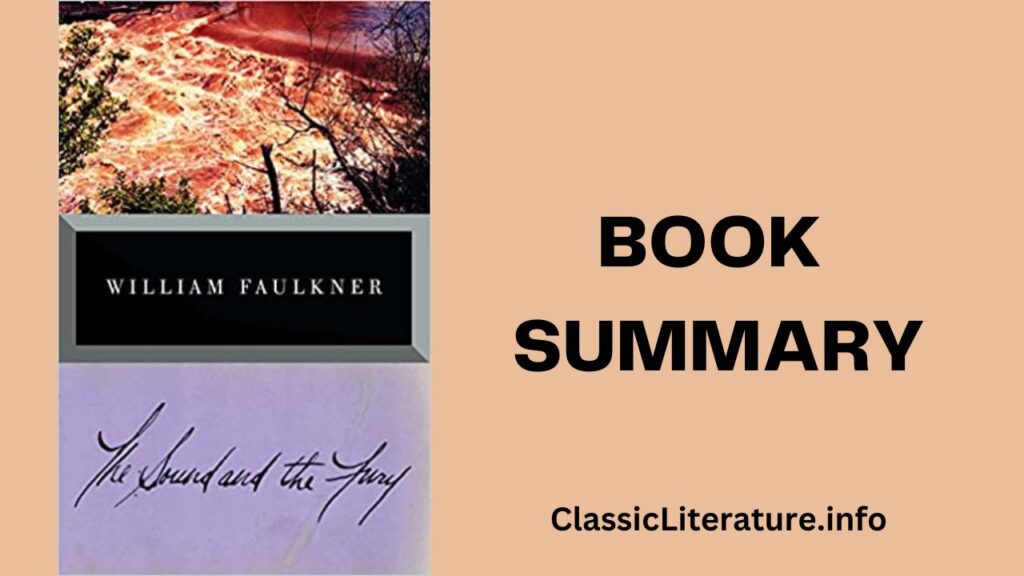
“The Sound and the Fury” by William Faulkner is a literary masterpiece that delves into the complexities of time, memory, and the disintegration of a once-great Southern family. Published in 1929, the novel is renowned for its innovative narrative structure and lyrical prose, earning Faulkner the Nobel Prize in Literature in 1949.
Set in the fictional Yoknapatawpha County, Mississippi, the story is divided into four sections, each narrated by a different character. The Compson family, once prominent and respected, now faces decline and dissolution. Through the fragmented perspectives of the Compson brothers and their sister, the novel explores the turbulent lives of the family members and the tragic events that shape their destinies.
The first section is narrated by Benjy Compson, an intellectually disabled man. His narrative is nonlinear, jumping through different moments in time, as he struggles to make sense of the world around him. The second section is narrated by Quentin Compson, a troubled Harvard student who is haunted by his family’s past and the burden of Southern traditions. His narrative is marked by introspection and the weight of his own internal struggles.
The third section shifts to Jason Compson, the bitter and cynical brother who embodies the decay and moral corruption of the Compson family. Jason’s narrative exposes the darker aspects of Southern society, filled with greed, racism, and manipulation. The final section is narrated by Dilsey, the Compsons’ African American servant, who provides a stark contrast to the family’s dysfunction and serves as a voice of wisdom and resilience.
Throughout the novel, Faulkner employs a rich and complex writing style, employing stream-of-consciousness, nonlinear narratives, and shifting perspectives to depict the characters’ inner thoughts and explore the themes of time, memory, and the dissolution of tradition. The language itself becomes a reflection of the characters’ psychological states, capturing their fragmented and often contradictory perceptions of the world.
“The Sound and the Fury” is not an easy read, but it is a profound and rewarding one. It challenges readers to confront the complexities of human existence, the destructive power of the past, and the ways in which language shapes our understanding of reality. Faulkner’s exploration of the human psyche and his ability to capture the essence of Southern culture and history make this novel a must-read for lovers of literary fiction.
Now, let’s explore some powerful quotes from “The Sound and the Fury” that highlight the beauty and depth of Faulkner’s writing:
“Caddy smelled like trees.” – Benjy Compson
This quote, from the perspective of Benjy, showcases Faulkner’s ability to evoke sensory experiences through language. It captures the profound connection between memory, emotions, and the natural world.
“Clocks slay time… time is dead as long as it is being clicked off by little wheels; only when the clock stops does time come to life.” – William Faulkner
This quote reflects Faulkner’s exploration of time and its subjective nature. He challenges conventional notions of time as a linear progression, suggesting that true understanding and meaning can only be found when one breaks free from the constraints of time.
“I give you the mausoleum of all hope and desire… I give it to you not that you may remember time, but that you might forget it now and then for a moment and not spend all of your breath trying to conquer it.” – Quentin Compson
This quote captures Quentin’s obsession with time and his struggle to escape its relentless march. It speaks to the themes of longing, regret, and the search for meaning in an ephemeral world.
Get Paperback or Kindle version of the book <–
“The Sound and the Fury” has garnered diverse opinions from readers. Here are a few real reader reviews that provide insight into the novel’s reception:
Review by Sarah:
“The Sound and the Fury is a challenging but incredibly rewarding book. Faulkner’s prose is poetic and his exploration of time and memory is mind-bending. The characters are deeply flawed and tragic, and their stories resonate long after the last page. It’s a must-read for lovers of literary fiction.”
Review by John:
“I found the nonlinear narrative and shifting perspectives confusing and hard to follow. It took me a while to get into the story, but once I did, I appreciated Faulkner’s beautiful writing. The novel offers a powerful commentary on the decline of the Southern aristocracy, but it’s not for everyone.”
Review by Emily:
“The Sound and the Fury is a masterpiece that captures the essence of the South and its troubled history. Faulkner’s portrayal of the Compson family is haunting and the way he plays with language and time is remarkable. It’s a challenging read, but one that stays with you.”
Review by David:
“I struggled to connect with the characters and found the nonlinear structure confusing. The novel has its moments of brilliance, but overall, it didn’t resonate with me. I can see why it’s considered a classic, but it wasn’t my cup of tea.”
Overall, “The Sound and the Fury” appeals to readers who appreciate intricate and thought-provoking literature. It’s for those who enjoy diving into complex narratives and grappling with themes of time, memory, and the human condition.
ABOUT THE AUTHOR
William Faulkner, born in 1897 in New Albany, Mississippi, was an American writer and Nobel laureate. He is known for his distinctive writing style and his exploration of Southern culture and history. Faulkner’s works, including “The Sound and the Fury,” “As I Lay Dying,” and “Light in August,” have made a lasting impact on American literature. His ability to capture the complexities of the human experience and his profound insights into the Southern psyche solidify his status as one of the most influential writers of the 20th century. Faulkner passed away in 1962, leaving behind a rich literary legacy.



